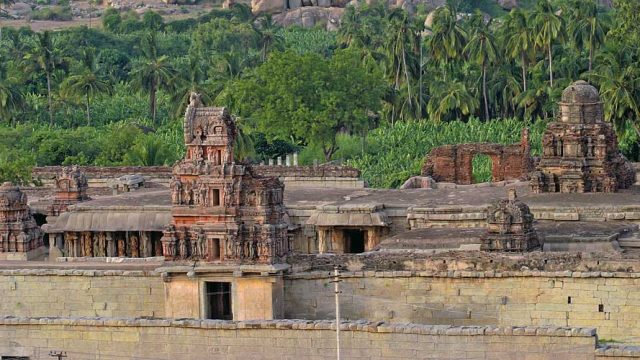The countryside overcast with nimbus clouds, had a strong breeze swaying the tall coconut trees, while the fields were being being ploughed by oxen. This was our first impressions on a drive towards Hampi, the Unesco world heritage site in Northern Karnataka. The smooth NH 14 got us into the hotel just under seven hours from the Bengaluru airport including a South Indian lunch pit stop. The tired bones were welcomed by the gigantic palatial facade erected by the hotel to make us feel that we have been transported into the bygone era of the Vijayanagar Samrajya of the 14th century.
After a warm welcome we were led to our suite to relax and rejuvenate. Hampi was a three-day mission and we planned our itinerary over delicious fare at the hotel’s restaurant, enclosed in the Lotus Mahal which is a life size replica of the one in the Hampi ruins.

We woke up the next morning to a scrumptious breakfast feast, a lap or two in the hotel pool and after downing filter coffee, were ready for the much awaited meeting with the ancient capital city of Hampi of the Vijaynagar dynasty. Our visit to the golden city started with the ‘royal enclosure ruins’. We visited the pink-walled queens bath which once held a swing on top of the actual bath for play. Later, we visited the ‘queen’s enclosure’ consisting of the acclaimed Lotus Mahal, with influences from Indo-Islamic architecture and the Jal Mahal, which housed cultural performances for the queen. The ‘queen’s enclosure’ led us to the Royal Gaj (elephant stables) which signified the importance placed on the animal during the reign of the king. This space for eleven elephants was a majestic structure worthy of the majestic animals trained for royal ceremonies , warfare combats and labour to build the monolithic structures of the city.
This further led to the ‘king’s enclosure’ which was one of the largest citadels in ancient India complete with a sabhagriha (conference hall), ‘king’s palace’, ‘room of secret’ and the ‘victory pedestal’!The ‘victory pedestal’ offered a birds eye view of the entire ‘royal enclosure’ with the four watch towers marking its boundary and array of official buildings such as the mint and granary. It was awe inspiring to see the sheer planning and geometric precision of the city. We went to our last monument for the day which was a temple dedicated to the Rama. It had well-preserved carvings of daily life, ceremonial rites and the story of the Ramayan. The intricate carvings were not only skilfully etched for ornamentation but also to teach moral values to the common people. With our thirst satiated after refreshing tender coconut water, it was time to say goodbye for the night.

Next morning we awoke with a vengeance to take on an action-packed day! We drove to the pier to catch our coracle to the Vithala temple. The coracle made us feel as if we were gliding on the water surface, thanks to the practised hands of the boatman. The Vithala temple complex had too many detailed carvings, including an eccentric pieces that caught my eye – a lion, horse and lady all rolled into one.
The iconic chariot stood in the centre of the complex, well deserving the position due to its outstanding beauty. The main temple complex had restorative work ongoing and we couldn’t go inside but instead marvelled at the musical pillars circling it. They were used to create music for festivals and celebrations.
A break was in order with cutting chai and pakodas while waiting for the local ferry to cross the river. Once beyond, we drove to Anjani Parvat, which is famed to be the hill of Lord Hanuman’s mother. After a steep 600-step climb, the breathtaking view from the hilltop made the effort worthwhile. We saw Hampi, the Tungabhadra river and the countryside as far as our eyes could see.

Lunching at an Israel shack, it offered us a view of the Virupaksha temples, our next stop. These ancient cluster of shrines devoted to Lord Shiva and Lord Parvati are the only functional temples of the Hampi ruins. The area outside the temples seemed like a canvas of stone walls , almost like a fortification indicating the importance of this complex.
A peak into this Unesco heritage site gave rise to a deeper thirst to explore more such ancient ruins in the country. During the drive back to the hotel, we were saddened that this adventure was over but the well-planned city of the Vijayanagar empire will forever be etched in our minds.
The information
Getting there: The nearest airport is in Vijaynagar (38 kms) and/or Hubli ( 143 Kms) from Hampi. The nearest train station is Hospet (13 kms). One can reach by car using NH4 from Bengaluru ( 350 kms) or Hyderabad NH7 ( 360kms)
Where to stay: There are umpteen options, from luxury to budget. Fpr luxury, there is Evolve Back while mid range options can be Clarks Inn and Heritage Resorts. Shanthi or Mowgli are god budget stay options. The best value we found was Hampi Boulders
Places to eat: Food is widely available but remember that Hampi is a religious centre so meat and alcohol aren’t allowed. Restaurants on the other side of the river do serve the two. One can try the German Bakery and Mango Tree for some delicious fare.
Entrance fees: Virupaksha Temple – Rs 2; Cluster of Vijaya Vittala Temple, King’s Palace, Queen’s Bath, Lotus Mahal, Elephant Stables etc – Rs 500 for foreign nationals and Rs 30 for Indians; Anjaneya Hill/Hanumani Temple – Free. Additional fees for camera and guides at sites




